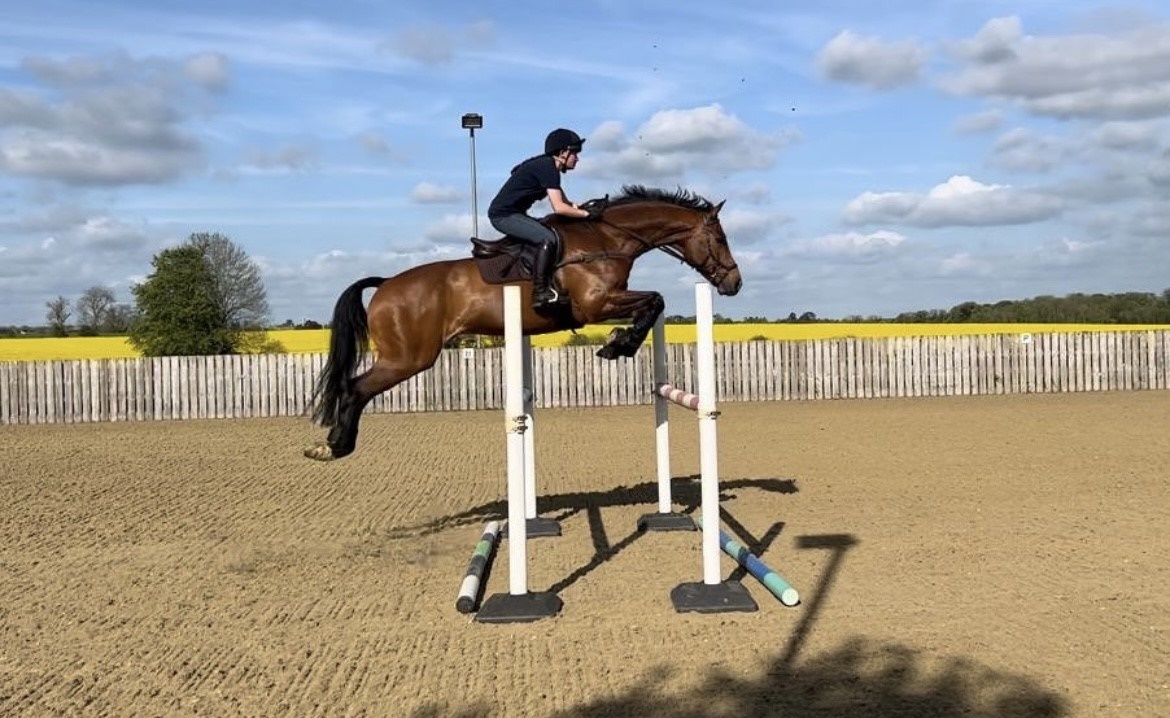BSc (Hons) Equine Science and Business (Foundation Year)
This course blends equine science and business management principles that are relevant to the breadth of the equestrian sector. There is an option to study some livestock science alongside equine science and business to gain a more holistic animal science programme of study.
Course overview
This degree course with a foundation year incorporates an extra year of study at the start of your course, so that you can progress with confidence. It will develop the skills you need for your later studies. It is particularly suitable if:
- You don’t have the grades for immediate entry onto a three-year course
- You have non-traditional qualifications or experience
- You’re starting university after some time away from education
- You’re looking for more support during the transition into university study
The equine industry generates huge amounts of revenue for some of the world’s major economies and is the second largest economy in the rural sector. The industry is continually looking for bright, skilled graduates. As well as benefitting from a blend of practical exercises and academic knowledge, you will gain essential experience with a work placement. You will also tap into our powerful network of industry contacts, including graduates from the University.
During year one all students will study modules that provide an excellent foundation of equine science and business skills. From year two onwards, you can tailor your degree to your interests by selecting from elective modules in one of three themes: equine sports science and training, additional business skills, or livestock management.
There will be plentiful industry visits and industry leading guest speakers allowing you to learn from the best there is.
Work placement
You will complete a 15-week placement in year two of the course. Students have completed placements at companies such as Plusvital Equinome, Godolphin, Weatherbys, NAF and Haygain. This is an excellent opportunity to develop a range of links within the growing equine industry.
The Integrated Foundation Year is suitable for applicants who have taken level 3 qualifications (A levels, BTEC etc.) in the UK. Overseas students who have not studied in the UK and completed their secondary education in their country, should look at taking an International Foundation Programme in order to meet the entry criteria for the degree programmes offered by the RAU.
Please note that a foundation year is not the same as a foundation degree (FdSc). A foundation year will usually lead onto a three-year degree course, whereas a foundation degree is a standalone qualification generally studied for two years.
For UK students (as of March 2020) a visa may not be required but this may change. For non UK/EU nationals (current Tier 4 visa students), the student will have to arrange their own visa.
Course content
The research project is an integral part of the course and provides essential experience in both design and execution of a piece of research. You can choose to focus on either science of business and you could also see your research project featured in one of the many academic journals that regularly publish our students' work.
Timetables
Please note that while we make every effort to ensure that timetables are as student-friendly as possible, scheduled teaching can take place on any day of the week. Wednesday afternoons are normally reserved for sports and societies activities.
Modules
Each module is worth a specified number of credits. Each credit equates to 10 hours of total study time. Total study time includes scheduled teaching, independent study and assessment activity.
Full-time students normally take modules worth 60 credits per 15 week semester but this can vary depending on your elective choice. Part-time students taking proportionally fewer credits per semester. All students take a total of 120 credits per level and 360 credits for the degree as a whole. Your overall grade for your degree is based on marks obtained for modules taken at level 5 and level 6 (weighted 30:70 accordingly).
The modules available for this degree are shown below. They may change for your year of study as we regularly review our module offerings to ensure they’re informed by the latest research and teaching methods.
Foundation year
The Foundation year will provide a common core of academic and study skills sufficient to prepare you for subsequent study and academic success at undergraduate level. It will give core underpinning knowledge, skills and understanding in key areas of contemporary issues, provide underpinning subject-related skills and knowledge in key areas required for undergraduate study, including Mathematics, Numeracy and IT. It will also provide generic skills and academic knowledge to support your confidence and discipline as appropriate for higher education study and give subject-specific grounding, in terms of research topics and study focus, to support progression into degree level study in your chosen degree.
- 0IFY20 Land-use and Management: This module explores diverse land-use practices in rural and urban contexts, focusing on sustainability, policy, and stakeholder perspectives. Topics include land tenure, protected landscapes, agri-environment schemes, agroforestry, rewilding, and urban regeneration. Students engage with field visits and debates to critically assess land management strategies. Assessment includes a 1000-word professional practice report, a 2000-word problem sheet, and four short in-class tests. The module supports evaluation of land-use decisions through political, environmental, and economic lenses, encouraging evidence-based reasoning and innovative thinking.
- 0IFY21 Countryside Evolution and Development: This module explores the changing nature of countryside environments, focusing on sustainability, policy, infrastructure, and socio-economic influences. Topics include green-belt development, eco-communities, land use, and rewilding. Students examine stakeholder perspectives and develop academic skills through seminars and independent tasks. Assessment includes a collaborative group presentation with reflection (10 minutes + 500 words) and a 2500-word individual skills portfolio. The module supports critical analysis of countryside change, sustainability principles, and the impact of development across local and national contexts.
- 0IFY22 Enterprise and Marketing: This module introduces students to core business and marketing principles, including strategy, sustainability, leadership, and market segmentation. Topics cover SWOT and PESTLE analysis, CSR, and the marketing mix. Students engage with real-world case studies and multimedia tools. Assessment includes a 300-word infographic, a 5-minute video presentation, and a 1000-word reflection report. The module supports critical evaluation of enterprise success, marketing decisions, and sustainable business practices through creative and analytical formats.
- 0IFY23 Land-based Data Handling: This module develops practical and analytical skills in land-based data collection and interpretation. Topics include cartography, GIS, fieldwork, laboratory analysis, and descriptive statistics. Students explore landscape features and environmental data using mapping tools and research design principles. Assessment includes a 5-minute presentation with 500 words and a 2000-word skills portfolio with graphs. The module supports critical evaluation of land-based evidence and promotes technical proficiency in data handling across ecological and geographical contexts.
- 0IFY24 Food and Farming: This module introduces core scientific principles in agriculture, covering livestock and crop husbandry, soil health, plant biology, and farming systems such as viticulture and urban agriculture. Topics include anatomy, nutrition, disease, and sustainability across the supply chain. Students engage in fieldwork, lab practicals, and farm visits. Assessment includes a 60-minute written exam and a 2000-word professional practice report. The module supports critical evaluation of sustainable farming practices and their impact on rural business and environmental management.
- 0IFY25 Developing your Skills and Undertaking an Individual Project: This module supports students’ transition to degree-level study by developing academic, digital, and professional skills. Topics include reflection, teamwork, critical thinking, presentation, and research. Students apply these skills in a self-directed project on a topic of their choice. Assessment includes a 1500-word skills portfolio, a 500-word written reflection, a 2000-word individual project, and four short in-class tests. The module supports critical evaluation of personal development and independent inquiry in preparation for higher education.
Year one
- 4Q001 Equine Anatomy and Physiology: This module examines the structure and function of equine body systems, including musculoskeletal, cardiovascular, respiratory, nervous, and endocrine systems. Students explore evolutionary adaptations and physiological processes through lectures, dissections, and microscopy. Assessment includes two laboratory workbooks and three 30-minute written exams. The module supports critical understanding of equine health, behaviour, and performance through anatomical and physiological analysis.
- 4Q004 Equine Health and Disease: This module explores equine disease processes, diagnostics, and treatment. Topics include immunology, bacteriology, virology, parasitology, wound healing, and blood analysis. Students develop lab skills and apply theory to case studies. Assessment includes a 1500-word case study and a practical skills assessment. The module supports critical evaluation of disease recognition, laboratory diagnostics, and sustainable parasite control in equine health management.
- 4Q005 Equine Nutrition: This module introduces equine feeding principles, nutrient biochemistry, digestive physiology, and diet formulation. Topics include feed analysis, metabolism, supplements, and feeding behaviour. Students engage in lab work, industry visits, and ration planning. Assessment includes a 5-minute audio-visual presentation and a 2000-word ration formulation report. The module supports critical evaluation of equine dietary needs, feed sustainability, and practical nutrition strategies.
- 4Q002 Equine Breeding and Genetics: This module explores equine reproductive science and genetics, covering anatomy, physiology, fertility, and breeding technologies. Topics include inheritance, coat colour, performance traits, and foal management. Students engage in lab work and industry visits. Assessment includes a 1000-word academic poster and a 90-minute written exam. The module supports critical evaluation of breeding practices, genetic traits, and reproductive management in equine contexts.
- 4Q003 Equine Business Enterprise: This module introduces core business principles for equestrian enterprises, including planning, finance, staffing, marketing, and operations. Topics include legislation, facility management, and entrepreneurship. Students engage with guest speakers, site visits, and workshops. Assessment includes a four-part portfolio covering operational, financial, staffing, and marketing strategies. The module supports critical evaluation of business viability and prepares students for management roles in the equine industry.
- 4M002 Professional, Practical and Study Skills: This module develops academic, employability, and practical skills for success in university and land-based careers. It includes reflective writing, data handling, digital literacy, and hands-on tasks relevant to the sector. Students explore sustainability, industry challenges, and professional development. Assessment includes a skills portfolio, a 1000-word reflective account, and a group presentation on a sustainability challenge. The module supports self-awareness, technical competence, and a sustainable mindset.
Year two
This programme will allow students who join the British Society of Animal Science (BSAS) to gain student accreditation on the Royal Society of Biology’s register of accredited animal scientists and technologists. The accreditation will provide you with international recognition as an accredited animal scientist.
- 5M001 Industry Engagement: This module provides students with a structured industry placement to develop professional, technical, and reflective skills in a real-world context. Students complete a minimum of 444 hours of work-based learning aligned to their career goals. Assessment includes a CV and personal statement (500 words) and a reflective portfolio (1000 words). The module supports employability, self-awareness, and the application of academic knowledge in professional settings.
- 5Q002 Equine Behaviour and Welfare Applications: This module investigates equine behaviour and welfare through ethology, neuroscience, and learning theory. Topics include feral horse dynamics, welfare frameworks, brain function, and training strategies. Students engage with fieldwork, dissections, and guest lectures. Assessment includes a 10-minute oral presentation and a 2-hour seen exam. The module supports critical evaluation of behavioural science, welfare assessment, and communication of findings to diverse audiences.
- 5Q005 Sustainable Forage and Turf Management: This module explores the production and management of grass for forage and equestrian sports surfaces. Topics include soil science, plant physiology, forage conservation, turf sustainability, and climate change impacts. Students engage in lab work, field visits, and forage analysis. Assessment includes a 1500-word article critique and a 2-hour seen exam. The module supports critical evaluation of sustainable pasture systems and forage quality for equine use.
- 5Q003 Equine Medicine: This module explores advances in equine medicine, including diagnostics, disease management, and responsible use of veterinary medicines. Topics include respiratory, gastrointestinal, endocrine, and infectious diseases, with a focus on One Health. Students engage with case studies and practical lab sessions. Assessment includes a 1500-word disease review and a 1500-word laboratory skills portfolio. The module supports critical evaluation of evidence-based treatment and contextualised care in equine health.
- 5B001 Marketing Management: This module guides students through strategic marketing planning, market analysis, and decision-making. Topics include global trends, consumer behaviour, competitor evaluation, and ethical marketing. Students apply frameworks to real-world business scenarios. Assessment includes two 2000-word professional practice reports focused on analysis and decision-making. The module supports evidence-based marketing strategy development and sustainable business practices.
- 5M002 Research and Evidence: This module develops students’ ability to design and justify research proposals using both quantitative and qualitative methods. Topics include study design, data analysis, ethics, and communication of findings. Students engage with real-world problems and explore research applications across disciplines. Assessment includes a 2500-word research proposal and a 2-hour online test. The module supports evidence-based thinking, analytical skills, and preparation for the Level 6 dissertation.
Plus a choice of ONE elective selected from:
- 5Q004 Equine Sports Physiology and Biomechanics: This module examines how horses respond to exercise and training across disciplines. Topics include physiological adaptations, sports nutrition, fatigue, and biomechanical analysis. Students engage with practical sessions using fitness and motion technologies. Assessment includes a 2000-word essay and a 1000-word academic poster. The module supports critical evaluation of equine performance, training strategies, and movement analysis.
- 5B003 Financial management: This module introduces financial principles and decision-making tools for business success. Topics include financial statements, capital budgeting, working capital, and financial planning. Students apply theory to real-world scenarios and analyse companies using ratio analysis. Assessment includes a 15-minute individual presentation and a 3000-word essay. The module supports strategic financial thinking and practical application in business contexts.
- 5A002 Livestock Husbandry: This module examines sustainable livestock management across ruminant and monogastric species. Topics include breeding, feeding, welfare, and environmental impact. Students engage with field trips, case studies, and industry tools. Assessment includes a 10-minute individual presentation and a 2500-word feeding plan. The module supports critical evaluation of husbandry systems, genetic strategies, and nutrition planning for health, performance, and sustainability.
Year three
- 6M001 Research Project: This module enables students to undertake an independent research project aligned with their subject area. Topics are student-selected and supported through supervisor meetings and workshops. Assessment includes a 5-minute progress presentation and a 12,000-word thesis or multimedia portfolio. The module supports critical evaluation, ethical research design, and evidence-based recommendations for real-world challenges
- 6Q001 Advances in Equine Nutrition: This module explores recent developments in equine nutrition, including digestive physiology, microbial activity, and sustainable feed ingredients. Topics include nutrient absorption, gut health, and diet formulation for different equids. Students engage with journal clubs and lab-based digestion studies. Assessment includes a 2000-word article critique and a scientific poster presentation. The module supports critical evaluation of equine diets, health, and sustainability in feed production.
- 6Q004 Equine Orthopaedics and Rehabilitation: This module explores equine orthopaedic disease, injury prevention, and rehabilitation. Topics include diagnostic imaging, discipline-specific injuries, physiotherapy, and treatment strategies. Students engage with case studies, lab sessions, and hospital visits. Assessment includes a 2500-word knowledge summary and a scientific poster presentation. The module supports critical evaluation of equine musculoskeletal health and evidence-based rehabilitation practices.
- 6B006 Rural Entrepreneurship: This module develops the skills needed to launch sustainable rural ventures. Students explore idea generation, business modelling, market analysis, financial planning, and ethical considerations. A study tour and guest lectures provide real-world insight. Assessment includes a 10-minute recorded pitch presentation and a 3000-word business plan. The module supports entrepreneurial thinking, strategic planning, and the creation of viable rural enterprises.
PLUS your choice of ONE elective selected from:
- 6Q002 Advances in Equine Training and Performance: This module examines contemporary training methods and technologies to optimise equine performance. Topics include biomechanics, welfare, tack innovations, and regulatory frameworks. Students engage with guest lectures, debates, and research analysis. Assessment includes a 1500-word article for a lay audience and a 2-hour seen exam. The module supports critical evaluation of training strategies and evidence-based approaches to equine athletic development.
- 6B001 Changing Consumer Behaviour: This module explores how individuals and societies consume, and how behaviour can be influenced toward sustainability. Drawing on psychology, sociology, anthropology, and consumer culture, students critically assess marketing strategies and behavioural interventions. Topics include ethical consumerism, identity, technology, and globalisation. Assessment includes a 1600-word annotated bibliography and a 2400-word essay. The module supports understanding and shaping consumer behaviour for positive social and environmental impact.
- 6A005 Advanced Livestock Nutrition and Breeding: This module investigates sustainable breeding and nutrition strategies across livestock species. Topics include genomic selection, reproductive technologies, feed innovations, and precision nutrition. Students engage with field visits, seminars, and practicals. Assessment includes a 2500-word breeding improvement plan and a 1000-word nutrition problem sheet. The module supports critical evaluation of livestock systems and data-driven solutions for animal health and productivity.
The availability of electives to individual students will be dependent on timetabling considerations and on sufficient students electing to take part.
Disclaimer information
The University has established various rules and regulations that you must agree to and follow if you accept an offer to study with us. View our full disclaimer notice.
Careers and graduate destinations
- Research scientist
- Stud manager
- Brand manager
- Technical sales representative
- Trainer
- Event manager
- Nutritional advisor
"The highlight I experienced on my course was our trip to Newmarket, as it made me realise how many different job opportunities there are within the equestrian industry. It made me realise I wanted to work in racing! I am now Business Co-ordinator for Bath Racecourse."
Emily Dinning, Graduate
Entry requirements
Typical offers
Required: GCSE minimum five GCSEs at Grade C/4 including English Language and Mathematics (or Maths Numeracy for Welsh applicants) plus satisfactory level 3 qualifications, one science based subject is highly recommended for this programme (Biology / Applied Science / Animal Science):
- A-Level: (example grades EEE) – minimum of 48 UCAS tariff points across either three A-levels or two A-levels and two AS level subjects or equivalent qualifications
- C&G Advanced Technical/BTEC - Level 3 Extended Diploma (1080) at Pass-Pass-Pass
- International Baccalaureate: 24 points
- Access to Higher Education: Pass course with 45 credits at level 3 (Pass in Functional Skills level 2 are accepted in lieu of GCSE English & Mathematics)
Visit the UCAS website to calculate your UCAS Tariff points from the qualifications and grades achieved.
You may also be eligible for a contextual offer if you’re from one of our link colleges, have been in care, from a non-white ethnic background, live in an area with low progression rates to university or you are a veteran/child of an armed forces family.
Flexible entry
The University welcomes interest from applicants who may not have the standard entry requirements. A wide range of qualifications and experience are accepted in order to join University degree programmes. The University always considers evidence of personal, professional (APL) and educational experience, (APEL), which show an ability to meet the demands of their intended programme of study.
Further information
Alternative entry routes are available for a range of other qualifications. Prior experience is also considered, subject to approval by the programme manager and admissions staff.
Read more general information about our entry requirements.
International students will also need to achieve IELTS Academic or equivalent at the appropriate level for your programme of study. English language requirements for international students.
For any further help, please contact our admissions team:
- Email: admissions@rau.ac.uk
- Telephone: +44 (0)1285 889912
Fees
2026-27 Applicants
For the academic year 2026-27 the tuition fees for this course are:
| UK | International | |
|---|---|---|
| Full-time Foundation year | £5,760 per year | £16,950 per year |
| Full-time | £9,790 per year | £16,950 per year |
For part-time study, please contact admissions@rau.ac.uk for further information.
Please also refer to the funding your time at university page.
Tuition fees may be subject to an inflationary increase each year as set out in our Access and Participation Plan and are subject to Government and regulatory body conditions.
If you are an Irish national you can check if you meet the requirements for Home Fees. Please visit the UKCISA website and consult the pdf guide “England HE – who pays Home Fees”. First check category ‘3 years in Republic of Ireland/UK/Islands, settled in UK’ or ‘Brexit temporary offer for courses starting before 2028: Irish citizens with residence in Europe or overseas territories’. You will possibly need to be fee assessed when you submit an application for study to the RAU.
Scholarships
The University offers a wide range of generous fee waivers and bursaries. To find out more about these, please visit the bursaries, awards and scholarships page.
Ready to take the plunge? Apply now
Applications should be made by the UCAS deadline to ensure we are able to offer you a place on your first choice course. However, if you have missed the deadline please contact Admissions@rau.ac.uk as there are usually places available.
If you would like to apply during UCAS Extra or Clearing, please check that we have places available.
Applicants wishing to study on a course on a part-time basis will need to apply directly to the RAU.
Please contact admissions@rau.ac.uk to discuss your requirements and obtain an application form.



